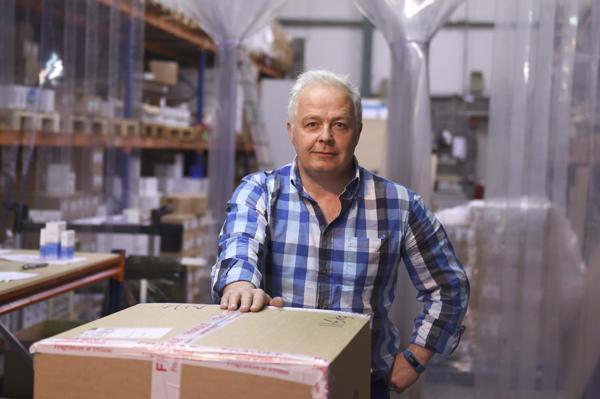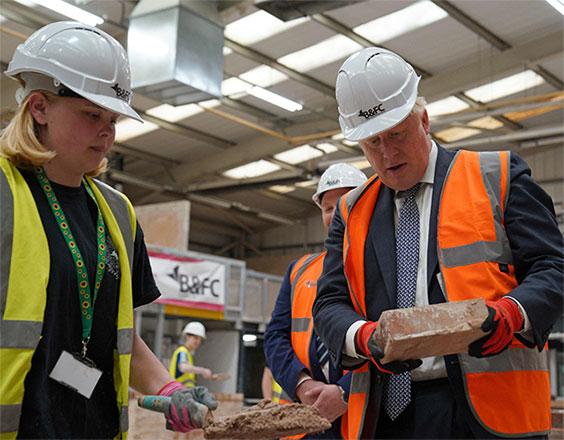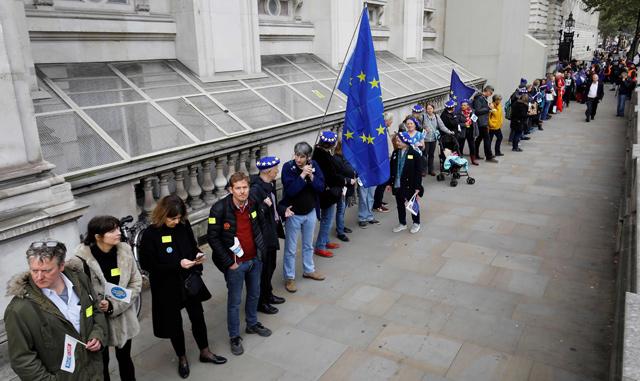You are here
From companies to policymakers, Irish fret over Brexit risks
By Reuters - May 12,2016 - Last updated at May 12,2016

David Cox, managing director of Fragrances of Ireland, poses for a photograph at his perfume warehouse in Wicklow, Ireland, on May 3 (Reuters photo)
KILMACANOGE, Ireland –– Irish perfumier David Cox is preparing for a sales drive across the sea in Britain, but fears that if the country votes to leave the European Union next month the expansion will be thrown into disarray.
From small exporters like Cox to the central bank, Ireland is finding that uncertainty is the biggest enemy in trying to anticipate the consequences of a British exit or "Brexit".
Cox, whose Fragrances of Ireland business operates from a bustling warehouse south of Dublin, says any blow to the confidence of the British gift shop owners he supplies and their customers will frustrate his plans.
"For a small company like us, we need people to be willing to take a chance and that requires them to be confident that the end consumer has got 20, 30, 40 pounds in his or her pocket to spend on something new. If they're worried, they won't."
Ireland has the EU's fastest growing economy but also more to lose than any other member state when its nearest and largest trading partner decides in a referendum on June 23 whether to quit the union that both countries joined together 43 years ago.
Brexit, which Prime Minister Enda Kenny has called "a major strategic risk" to Ireland, could have far-reaching implications not only for trade and an economy still recovering from a banking collapse in 2008-09.
Peace in British-ruled Northern Ireland, security of energy supplies and freedom of movement for the large numbers of Irish citizens working in Britain might also fall into doubt.
Ireland may not spring to mind as a perfumer producer. But Fragrances of Ireland — like so many firms in a country of only 4.5 million people — has built up its business in export markets from its base in the small County Wicklow town of Kilmacanoge.
Seventy per cent of sales are in the United States, compared with only 10 per cent in Britain. But Cox aims to raise the number of small, independent British retailers that his firm supplies from 150 to 1,000 within the next two years.
Two years is also the period laid down in the EU's Lisbon Treaty for any country to negotiate an EU withdrawal.
No one knows what relationship Britain might hammer out with the EU should it leave, and Cox fears the country's economy and consumer sentiment will weaken during such a period. This would make it tough for his business to establish its name alongside global rivals such as L'Oreal and Estee Lauder.
"Our plans would definitely be stalled because it's easy to cut back on a bottle of perfume you don't know," said Cox, whose firm employs 25 full and part-time workers.
Evidence is growing that the British economy is already slowing before the referendum and the pound has weakened against the euro. Though not yet critical, Cox says this depreciation is hurting his profit margins.
Some larger Irish firms have hedged against the currency risks. However, Cox said there is little a company of the size of his can do to protect itself.
In a survey of members last month, the Irish Exporters Association said 60 per cent reported that the sterling weakness had already affected their business. Just 5 per cent were in favour of Britain leaving the EU.
Ireland's finance ministry warned last month that the level of uncertainty from abroad generally was higher than at any stage since the financial crisis. A further five percentage point depreciation of sterling against the euro would reduce Irish gross domestic product (GDP) by 0.8 per cent a year for the next six years, it estimated.
Ireland is vulnerable to any Brexit-related recession in Britain. Research by Davy Stockbrokers shows that a 1 per cent decrease in UK economic output has led in the past to a 0.3 per cent drop in Ireland.
The Irish economy is still forecast to expand by almost 5 per cent this year, but the country needs all the growth it can achieve to cut a public debt that at almost 90 per cent of the GDP remains a problem.
Contingency plans?
Historic and personal links between Britain and what is now the Irish Republic, which broke away in the 1920s after a guerrilla war of independence, are also strong. Many Britons have family roots in Ireland and Irish citizens resident in Britain can vote in the referendum.
Kenny used his re-election as prime minister last week to highlight the "profound importance" of the referendum and has told his British counterpart David Cameron, who is campaigning to remain in the EU, that he will do whatever he can to help.
Finance Minister Michael Noonan also said this week that Dublin would be urging the Irish community in Britain and Northern Ireland to vote to stay in.
Ireland acknowledges there are limits to its own contingency planning. A Brexit group of senior officials has been set up in Kenny's department, government sources have said. Dublin is "exploring the potential risks and planning accordingly", Noonan told parliament last month.
The central bank has warned that Irish banks, which have lent heavily to the British property sector, would be hurt by a Brexit and has been working with them on their preparations.
But generally advance planning is extremely difficult. "It's unambiguous that the economic effect on Ireland is negative — the question is how big," central bank chief economist Gabriel Fagan said last month. "That depends very crucially on the scenario you envisage regarding the relationship between Britain and the rest of the EU."
Long-term implications
Irish farmers and food producers, major suppliers to the UK, are also vulnerable, but the risks go beyond economics.
Dublin officials worry about the impact on Northern Ireland, which has the only land frontier between the United Kingdom and the rest of the EU. During three decades of violence, this was marked by military checkpoints until a 1998 peace deal.
The fear for many is that any new border restrictions could endanger peace by reenergising demands for a united Ireland which would raise tensions with pro-British unionists. Northern Ireland's nationalist deputy first minister, Martin McGuinness, has already called for a vote on unification if Britain leaves the EU.
Doubts also surround the right of Irish citizens to live and work in Britain, which long predates the EU.
Pro-Brexit campaigners want tougher controls on immigration from the EU. While these demands have been directed at Eastern Europeans, an Irish government-commissioned report said last year that a Brexit also opens the possibility of restrictions on the free movement of workers between Ireland and Britain.
Brexit may not be all bad. The report noted some companies keen to stay in the EU might move from Britain to Ireland.
Related Articles
LONDON — Britain said on Thursday it was readying new legislation to rewrite its Brexit commitments on Northern Ireland but denied it was br
BRATISLAVA — The European Union will not conclude an exit agreement with Britain or give London a transition period after Brexit without a d
Ireland's economy grew at the fastest rate in the European Union (EU) last year, data showed Thursday as the eurozone nation added it would repay more International Monetary Fund (IMF) bailout loans early.

















